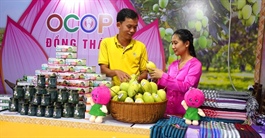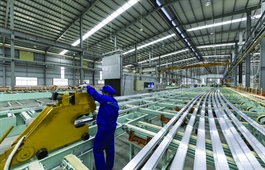Food exporters urged to evolve to tap into large markets
Food exporters urged to evolve to tap into large markets
There remains untapped potential for Viet Nam's exports of agricultural and food products to major markets in Asia, Europe and America, but it is important for Vietnamese enterprises to improve the quality of their products, sharpen their competitiveness, and better grasp current international consumption trends, experts have said.

Vu Anh Son, a Vietnamese Trade Counselor in France, told vnbusiness that he failed to find any Vietnamese-branded cashew products in supermarket chains and hypermarkets in France, even though Viet Nam's cashew now accounts for 50 per cent of the French market.
This unsatisfactory performance is attributable to the limited competitive capabilities of domestic enterprises and their focus on exporting or wholesaling agricultural and food products instead of developing brands to increase the added value of their food products.
According to Son, increasing the added value of agricultural and food items will help strengthen the competitiveness of Vietnamese firms striving to export. They should also pay attention to current food consumption trends in imported markets, Son suggested.
Despite good agricultural and food products the firms can offer for export, they still have insufficient research and understanding about approaching export markets and current food consumption trends in large markets such as Asia and Europe, Son added.
For example, currently, European customers have a great demand for nutritious and healthy snacks with a stable and sustainable supply. That will open up opportunities for Vietnamese companies if they can grasp this consumption trend and then diversify their products to meet that demand, Son said.
In addition, improving product quality remains a must, experts said.
Nguyen Truong Thinh from Luong Quoi Coconut Co Ben Tre Province agreed. He said product quality is among the top concerns of international customers.
As consumer demand increases, they require the higher quality of products. Thus, local firms, especially those in the agricultural and food processing sectors, need to apply advanced technologies in their production to ensure the best quality of their products to meet the needs of international customers, he told vnbusiness.
During the first five months of 2022, the country's export value of main agricultural products surpassed US$9.4 billion, up 10.4 per cent, according to the Ministry of Agriculture and Rural Development (MARD).
Among products and product groups posting a turnover of over $1 billion were coffee, rice, cashew nuts, fruits and vegetables.
MARD said that it has stepped up bilateral and multilateral cooperation activities. Its units have focused on negotiating and promoting the export of passion fruit and grapefruit to Australia; rambutan, star apple, custard apple, cassava slices, sugar and milk to Thailand; lemon and grapefruit to New Zealand, and bird's nest, feather products and fish meal to China.
Minister of Agriculture and Rural Development Le Minh Hoan said that his ministry would review and adjust policies to encourage and support businesses to invest in agriculture and develop products in accordance with international standards and practices to serve the export of agricultural products better.
Hoan stressed the need to strictly comply with regulations related to labelling, traceability, geographical indications, quarantine, packaging, quality and types of agricultural products, and business codes.
The ministry will maintain negotiations to remove barriers and increase the export of additional agricultural products to major and potential markets, such as durian, birds' nest, passion fruit, avocado, grapefruit and coconut to China; longan, grapefruit, and passion fruit to Japan; and shrimp, grapefruit, litchi, rambutan, processed poultry and cattle meat to South Korea.
It is important to invest more in improving the processing and preservation to increase the added value of products.
The ministry will maintain effective implementation of free trade agreements signed with other countries and regions over the world, as well as the coordinate with Vietnamese embassies and trade and agriculture offices to collect and provide information about foreign markets and tastes for local businesses, and help them boost trade promotion, Hoan said.























